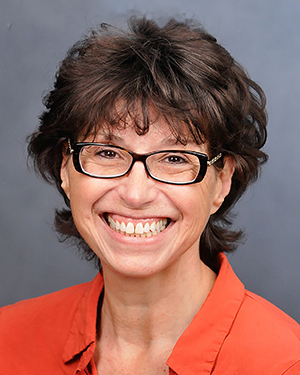Bladder Cancer Survivor
A Storyteller at Heart
 Mechele Leon is grateful the first and only symptom she had led to a quick diagnosis of bladder cancer. She wasted no time in seeking a second opinion, educating herself and making treatment decisions. As an actor, director and educator, turning life into stories is what she does, so writing and performing in a humorous one-person theatrical production helped her cope. In “Bladder Interrupted,” Mechele focuses on the strange parts of finding cancer, losing a bladder and moving on.
Mechele Leon is grateful the first and only symptom she had led to a quick diagnosis of bladder cancer. She wasted no time in seeking a second opinion, educating herself and making treatment decisions. As an actor, director and educator, turning life into stories is what she does, so writing and performing in a humorous one-person theatrical production helped her cope. In “Bladder Interrupted,” Mechele focuses on the strange parts of finding cancer, losing a bladder and moving on.
I had just finished some yoga stretches and stopped in the bathroom before leaving for a walk. To my complete surprise, I noticed a toilet bowl full of blood. I went to the ER, where I had a CT. The doctor saw a mass on the scan that he thought was likely bladder cancer. I had emergency surgery to remove the tumor at a local hospital. After the pathology report came back, I was given my diagnosis: Stage II high-grade, muscle-invasive bladder cancer. I was shocked. I was 59, hadn’t had any other symptoms and knew nothing about bladder cancer.
I got a second opinion on my pathology results and learned I had a rare type of cancer cell that hadn’t been researched much. Within a few days, I began to educate myself. I posted on the Bladder Cancer Advocacy Network (BCAN) website and received information and support right away.
A surgical oncologist at a nearby National Cancer Institute- designated cancer center and a genitourinary oncologist at another hospital became my team.
With the type of cancer I had (where the tumor had penetrated into the muscle), I had no choice but to have the bladder surgically removed. Although there was no visible metastasis, I completed four rounds of neoadjuvant chemotherapy before the surgery. Chemotherapy was hard. There’s no way around it.
After that treatment, I had six weeks off before having a radical cystectomy. There is a reason the word radical is used. I was having my uterus, fallopian tubes, ovaries and many lymph nodes removed in a surgery known for a high rate of complications. The surgeon was basically going to rebuild my urinary system. On top of that, I had to choose a type of bladder diversion for how I would live on a daily basis without a bladder. It felt like everything kept coming at me in waves.
It would have been easy to get obsessed with choosing a diversion strategy. I thought about the risks of all the options and my deal breakers. Before, I felt good, and I traveled. Those were the things I wanted to preserve. And, I didn’t want to worry about leaking. I worried about my options for weeks, then realized that urinary diversion wasn’t the point. I needed to fight the cancer and save my life. How I’d pee without a bladder was a small issue in the scheme of things. I chose to have a urostomy bag.
The surgery went off without a hitch. No viable cancer was found in my lymph nodes or anywhere else. It was the best prognosis I could have and improved the odds of not seeing the same cancer again.
I don’t regret my decision to have a urostomy. I belong to a stoma support group with people of all ages. We have young people who have ostomies because of diseases such as irritable bowel syndrome and Crohn’s disease. They more than manage. They even swim. The world has gotten so accepting of different body types and prosthetic limbs. I hope it’s just a matter of time before ostomies don’t have such a stigma.
I think keeping a diary is a helpful outlet. I wrote in a journal and blogged for a while. Other writers inspired me. One author really opened my mind when he explained his theory about how people react to catastrophic illness. He believes people don’t know how to tell the story of who they are when their fate is unknown and, instead, they become part of a medical narrative. That made sense to me because I’m a storyteller at heart, and if we are who we say we are, it’s easy to see how cancer can make you a narrative wreck.
I’ve been in the theater for my entire life. In my head, I saw the funny and twisted things about my situation, so I collaborated with a writer/actor/director and created a humorous play that features my many narratives. From parodying a YouTube video and cooking demonstration to a podcast and blogging, I share my bladder cancer experience — what I like to call just another remarkable story in my life. It’s not only a healthy release for me, I hope it raises awareness about the need for bladder cancer education and continued research.
I’m cancer-free, and my oncologist recommended a follow-up CT every six months for the first year, then annually for three years post-treatment.
I’m thankful I had a symptomatic event that couldn’t be ignored, but bladder cancer doesn’t always work that way. If you have a symptom, don’t ignore it. The timing can make a huge difference.


